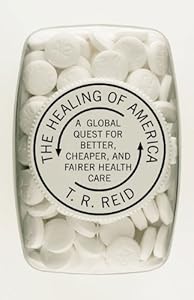- Health insurance company profit margins
- Health insurance company incentives to cheat
- Costs to doctors of dealing with insurance companies
- Doctor debt service
- Doctors' salaries and expected standards of living
- Doctor malpractice insurance
- Regulatory requirements on health insurance companies
- Non-profit health insurance companies
- Requirements that health insurance companies cover anyone and everyone, regardless of condition and cannot deny claims
- Government funding of higher education including medical school
- Health care price controls
- Government incentives for preventive care
- Government subsidy or funding of malpractice insurance
- The role, effectiveness, and cost of American medical testing
- The cost of providing any publicly funded service in a large, sparsely-populated country (the cost of transportation and transportation infrastructure in countries like Australia, Canada, and Russia)
- The cost of other American federal government priorities, including foreign aid, military spending, etc.
- France is continually renegotiating and restructuring how it pays for health care
- The UK simply doesn't offer some life-saving procedures
- Canada offers poor access to specialists
- Japan pays for lots of high-quality health care for an aging population by squeezing doctors to the point that a certain amount of unofficial payment in the form of a tip or bribe is customary
Reid presents universal health care as a moral choice and a moral commitment, and once he's done that any further analysis has to be done in terms of values, not data, so when he presents data it's hard to know when he's being fair. He also chooses a mix of metrics for comparing different countries, and a reasonable person might fairly question some of his choices. Certainly infant mortality rate is important, but I have my doubts about any metric that attempts to adjust life expectancy by a quality of life measure, or even life expectancy at sixty: the last of these might be a good way to examine and compare populations, its usefulness as a guideline or a prescriptive measure would be limited.
What I'm saying is this: it would be great to have lots of Americans living to the age of eighty-five or ninety, but I'm not sure it's a proper goal when making health care policy decisions.
Now, finally: what do Reid's metrics suggest about the current health care bill(s)? Reid would probably scream at the prospect of requiring all Americans to buy health insurance without doing something to cap the cost of health insurance (he'd suggest the government take all the profit out of the health insurance industry) and he'd probably suggest that the assumption that the free market will bring down costs a sick joke, since if I understood him correctly most health insurance companies function as local near-monopolies: each, in each of its target markets, has lots of pricing power because it has very little competition. Reid would like the restrictions on denying coverage for pre-existing conditions.
And I would guess he'd say what a lot of liberal and progressive pundits have said: this is a lousy start on a good process of increased regulation of the health insurance industry that doesn't do a thing about the health care (providing) industry.
The problem here, of course, is that the Democrats have paid so much for this bill in publicity and political capital that it will likely cost them seats (and power) in the next Congress, so they will be less able to press on to more ambitious goals like price controls and direct public funding of doctors and hospitals. On the other hand, it's hard to imagine the Republicans completely dismantling whatever system results from the current bills.

![Reblog this post [with Zemanta]](http://img.zemanta.com/reblog_e.png?x-id=4d2aadf8-f791-49ca-9464-4735fba9630e)

No comments:
Post a Comment